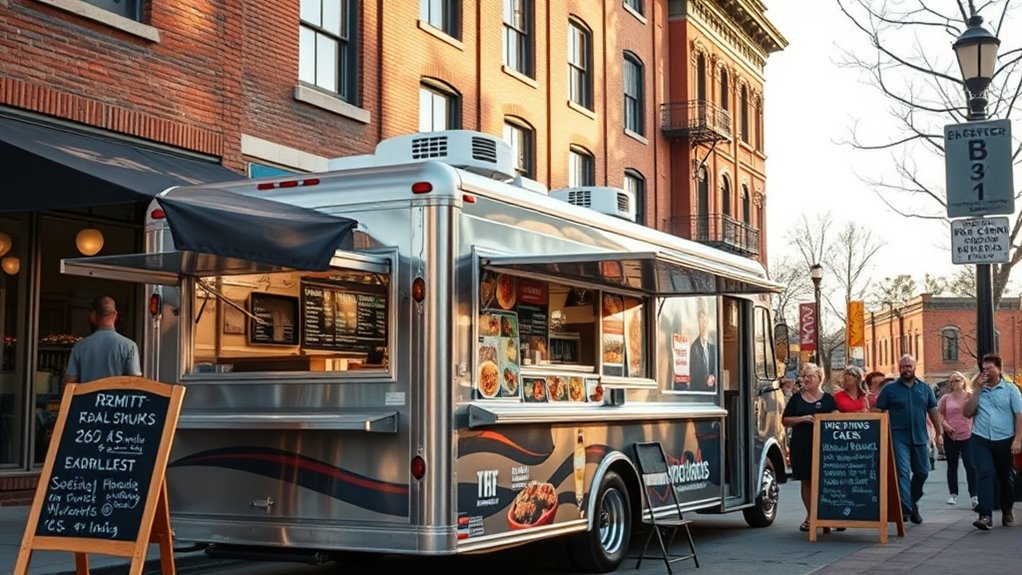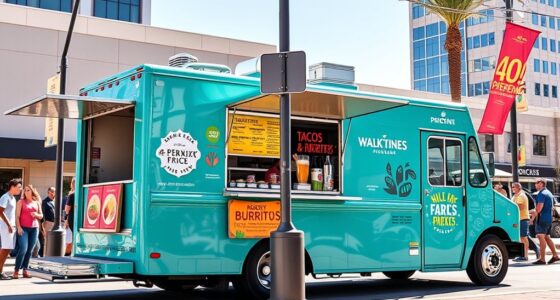Starting a food truck in Athens, Georgia, involves obtaining several permits, including a $515 mobile vendor permit, health permits, and possibly extra licenses for specific locations. Expect initial costs around $1,800–$2,000, with ongoing expenses like permits, fuel, and supplies. Choose busy spots with good accessibility and work within local zoning laws. Develop a simple, compliant menu and use marketing like social media to attract customers. If you keep exploring, you’ll find how to navigate these steps smoothly.
Key Takeaways
- Obtain necessary permits including a $515 Athens permit, health department approval, and ensure compliance with zoning and community standards.
- Initial costs range from $1,800–$2,000 for permits, licenses, and inspections, plus ongoing expenses like commissary rentals and vehicle maintenance.
- Choose high-traffic, accessible locations near universities, event spaces, or food truck parks, ensuring property owner approval and zoning compliance.
- Develop a simple, local-flavored menu with allergen info, and leverage social media, local events, and loyalty programs for marketing growth.
- Manage operational challenges by passing health inspections, maintaining equipment, securing parking permits, and tracking hidden fees and renewal costs.
Navigating Permits and Licensing in Athens
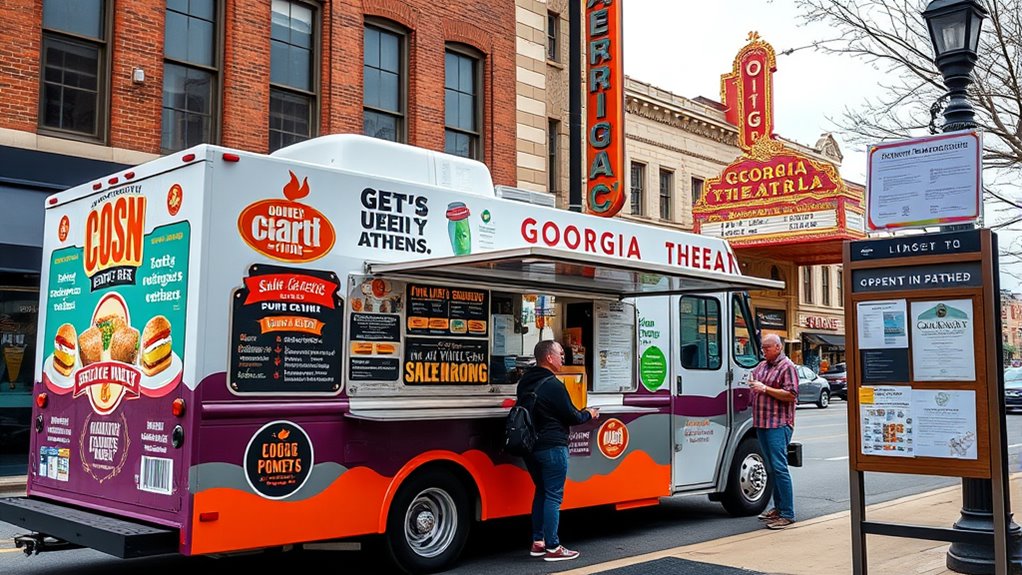
Managing permits and licensing in Athens can seem complicated, but understanding the requirements is essential for legally operating your food truck. First, you’ll need a $515 permit to work in downtown areas and city parks, approved by the Athens-Clarke County commission. You’ll also require a base of operation permit and a separate health department permit for your mobile unit. This involves submitting a detailed layout, menu, and photos for approval. The health department enforces inspections and reviews plans to make certain of compliance with food safety rules. Additional permits, like sidewalk vending or special event licenses, may be necessary depending on where you operate, with fees varying. Remember, all permits are non-transferable and must be obtained for each county where you’ll serve food. Regulatory hurdles and limited downtown access can further complicate your setup process, making it crucial to stay informed about local policies. Staying updated on food truck regulations ensures smooth operation and helps avoid penalties.
Estimating the Costs to Launch and Sustain a Food Truck

Getting your food truck off the ground requires understanding both startup and ongoing costs, including initial permit expenses and daily operational fees. You’ll also need to budget for hidden and variable charges like maintenance, insurance, and location-based expenses that can add up quickly. Being aware of these costs helps you plan financially and avoid surprises down the road. Additionally, considering the costs associated with marketing and branding, such as truck wraps and promotional events, is essential to attract and retain customers in Athens. Food truck permits and licensing fees can vary depending on local regulations and the scope of your operation. Implementing space optimization strategies can help maximize your truck’s efficiency and reduce unnecessary costs, making your business more sustainable.
Initial Permit Expenses
Launching a food truck in Athens, Georgia, involves several initial permit expenses that you need to budget for carefully. Expect to pay around $515 for the Mobile Food Vendor Permit and additional costs for a business license, which vary based on your operation. Health department permits, including inspections, typically cost several hundred dollars annually. You’ll also need access to a licensed commissary kitchen, which can run $800–$1,200 per month and affect your permit approval. For special events or festivals, permits may range from $50 to several hundred dollars. In total, initial permit and licensing costs often fall between $1,800 and $2,000, depending on your specific needs and compliance requirements. Grapes are toxic to dogs, so ensure your food truck offerings avoid such ingredients to prioritize safety and compliance.
Ongoing Operational Costs
Understanding the ongoing costs of operating a food truck is essential to maintaining a profitable business in Athens, Georgia. Fuel expenses typically average around $600 monthly, covering gasoline and propane. Routine maintenance, including oil changes and tire replacements, costs between $500 and $1,000 annually, with seasonal climate effects adding an extra $300–$800 yearly. Ingredient costs can exceed $1,000 weekly, depending on your menu, while disposable supplies like containers and utensils also add up. Staffing expenses vary based on team size, with wages, taxes, and uniforms impacting monthly budgets. Utilities, such as electricity and water, cost $500–$1,200 annually, including commissary fees. Additionally, marketing efforts—social media, event participation, and promotional materials—are ongoing investments to grow your presence and sales. Effective marketing strategies are crucial for attracting customers and increasing revenue over time. To stay competitive, some operators also allocate funds for training and development to enhance team skills and customer service quality.
Hidden and Variable Fees
Estimating the true costs of operating a food truck in Athens, Georgia involves more than just the obvious expenses; hidden and variable fees can quickly add up and catch you off guard. You may face fluctuating permit costs, especially if you operate across multiple counties, and renewal fees that sneak in annually. Commissary kitchen rental fees, often between $800 and $1,200 monthly, represent ongoing expenses that can vary with usage. Vehicle-related costs like maintenance, repairs, registration, and insurance can unexpectedly strain your budget. Additionally, licensing may include hidden charges such as fire safety inspections, utility deposits, or environmental compliance fees. These costs can fluctuate based on local regulations and demand, making careful budgeting essential. Insurance premiums and legal fees can also add to your expenses, emphasizing the importance of thorough financial planning. Moreover, understanding and managing variable costs is key to maintaining profitability in a dynamic operating environment.
Choosing Prime Locations and Understanding Zoning Regulations
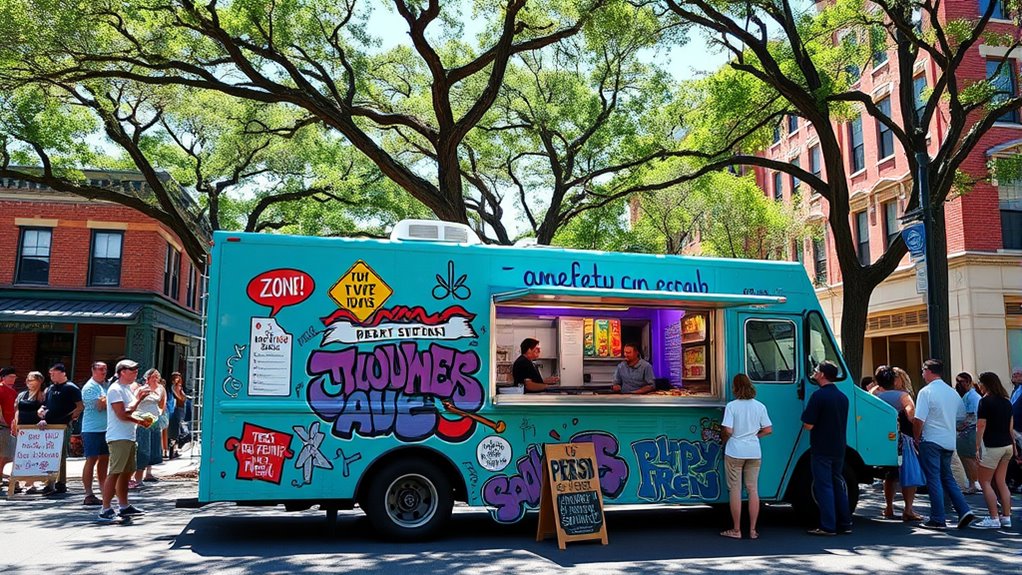
Choosing the right location is essential for your food truck’s success in Athens, but you need to understand local zoning laws and permit requirements first. Make sure your vending spots comply with Athens-Clarke County codes and have approval from property owners when operating on private property. Focus on high-traffic areas with accessible restrooms within 200 feet to maximize sales and stay within legal boundaries. Additionally, researching local building codes can help ensure your setup meets all safety and legal standards.
Zoning and Permitting
Mastering the zoning and permitting landscape in Athens, Georgia, is essential for establishing a successful food truck operation. You must follow local rules to guarantee legal operation and avoid fines. The Athens-Clarke County Code restricts where you can operate, such as certain downtown streets like Hancock and College Avenue, with permits that need renewal. You’ll need permits from various departments, including street, health, fire, and finance, and must get zoning approval before setting up. Restrictions on accessory structures and site development may limit storage or prep areas, especially in residential or commercial districts. Additionally, you need property owner permission and must adhere to designated operational hours and location restrictions, ensuring your food truck stays compliant with local zoning and safety standards.
A new sentence with security considerations and the rest of the sentence.
Optimal Vending Spots
Selecting the right vending spots can remarkably boost your food truck’s visibility and sales. High-traffic, centralized locations near major roads, busy commercial areas, or university campuses attract steady crowds. Food parks and shared spaces foster community and reduce operational costs, while well-chosen neighborhoods with diverse demographics demand tailored menus. Accessibility, such as parking, public transit, and 24-hour sites, enhances customer convenience. Additionally, securing prime spots near nightlife or event venues boosts evening sales. Consider the table below for strategic placement:
| Location Type | Benefits |
|---|---|
| High-Traffic Intersections | Maximize visibility and foot traffic |
| Food Truck Parks & Shared Spaces | Community engagement, cost-efficiency |
| Near Universities & Schools | Consistent daytime customers, student traffic |
| Nightlife & Event Venues | Evening and weekend sales, lively atmosphere |
Understanding zoning rules guarantees compliance and smooth operation. Researching local regulations ensures you select suitable locations and avoid penalties. Being aware of zoning laws can help identify restrictions and opportunities for your food truck’s placement.
Developing a Compliant and Appealing Menu
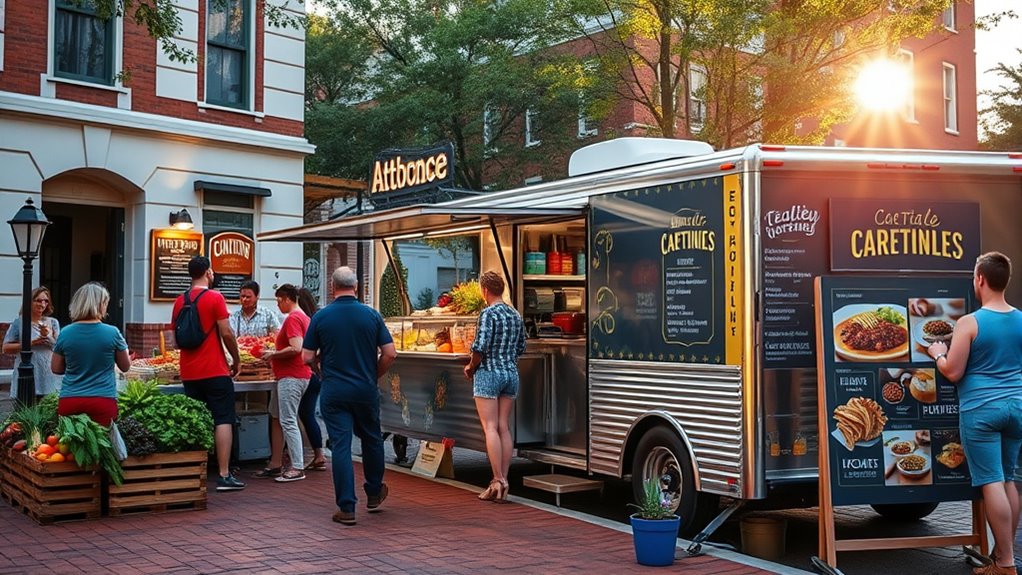
Developing a compliant and appealing menu for your food truck in Athens, Georgia requires careful planning to meet local health regulations and attract customers. You must submit your menu with detailed sketches of your truck layout and base of operation when applying for your food service permit. Verify all menu items meet state food safety standards, especially those requiring extensive prep, which may need a commercial kitchen. Keep your menu simple to streamline operations, with items that can be safely stored and served at proper temperatures. Consider local flavors or quick-serve options to boost appeal. Additionally, include vegetarian, vegan, or gluten-free choices, and adjust seasonally for freshness. Clear ingredient and allergen info are essential for compliance and customer trust.
Design a simple, compliant menu featuring local flavors and allergy-friendly options for your Athens food truck.
- Submit a detailed menu with permit applications
- Focus on simple, prep-minimal items
- Incorporate local flavors and quick-serve options
- Offer allergy-friendly and dietary choices
- Plan for seasonal menu adjustments
Effective Marketing Strategies to Grow Your Food Truck Business
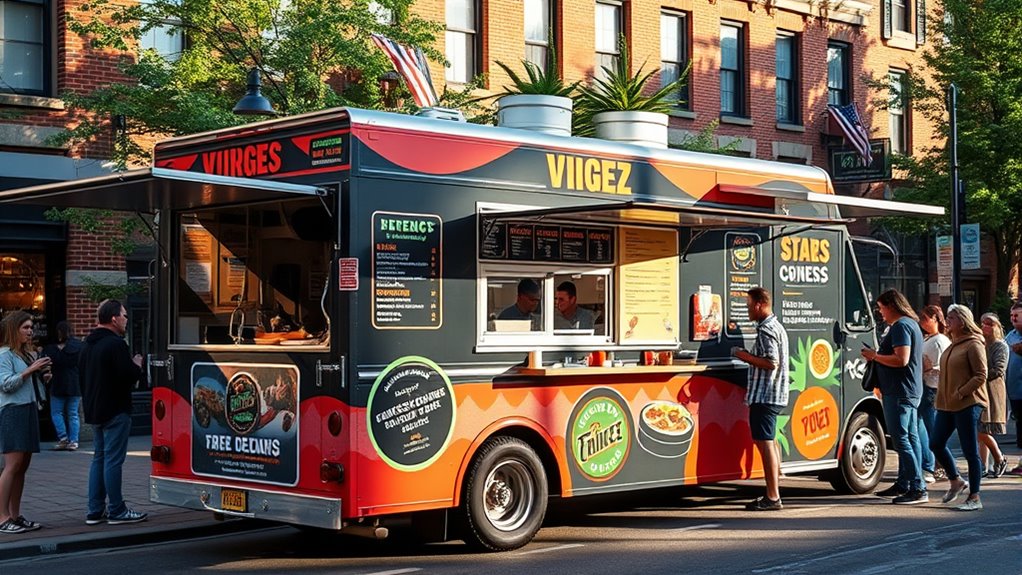
To effectively grow your food truck business in Athens, Georgia, you need a strategic marketing approach that combines digital engagement, community involvement, and data-driven tactics. Leverage social media platforms like Facebook, used by 75% of food trucks, to boost visibility and engagement. Running targeted ads and active posting can increase sales by 20% and help customers discover your truck. Participating in local festivals and events—attended by 80% of food trucks—drives foot traffic and fosters loyalty through direct interactions. Use data analytics to optimize marketing efforts, achieving a 25% higher ROI, and implement loyalty programs to encourage repeat visits. Form local partnerships and maintain a strong community presence through sponsorships and collaborations to expand your reach organically. Additionally, incorporating seasonal and holiday-themed promotions can lead to a 25% rise in customer visits and 50% increase in customer engagement, further strengthening your business’s local footprint. Regularly reviewing your marketing data can help you adapt your strategies for even better results.
Overcoming Operational Challenges and Ensuring Compliance
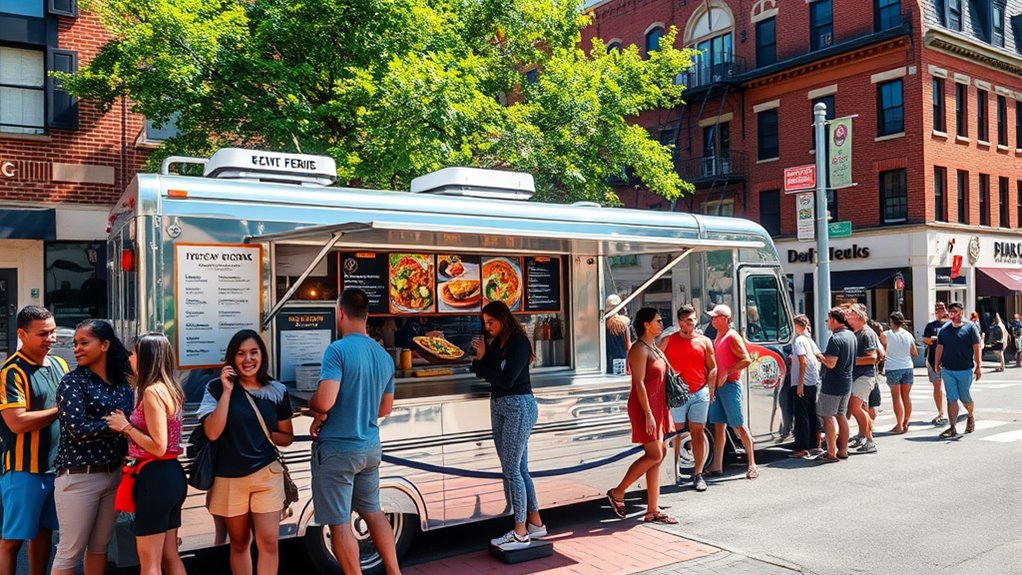
Running a successful food truck in Athens, Georgia means more than just great food and marketing; you also need to navigate a complex web of operational challenges and compliance requirements. You’ll need to secure health permits for both your commissary and mobile unit, passing thorough inspections that check water temperatures, storage, sanitation, and cleanliness. Be aware that permits from one county are recognized statewide, but some paperwork is necessary when operating elsewhere. Parking can be tricky, especially downtown, where limited spaces and local ordinances restrict long-term parking, requiring permits and awareness of community rules. Make certain your truck’s equipment is fully operational, clean, and well-maintained. Proper documentation, including signed agreements with a licensed commissary, is critical to avoid delays or rejection of permits. Additionally, staying informed about food safety laws and maintaining proper record-keeping can help prevent violations. Ultimately, comply with Georgia’s statewide food safety laws and local health department inspections to stay compliant and avoid penalties.
Frequently Asked Questions
How Long Does the Permit Approval Process Typically Take in Athens?
You’re wondering how long the permit approval process takes in Athens. Typically, it ranges from 2 to 3 months, depending on your preparation and submission accuracy. You should submit your applications, including health and zoning permits, at least 60-90 days before your planned operation. Coordinating with commissary kitchens and ensuring all documentation is complete can help speed up the process and avoid unnecessary delays.
Are There Any Grants or Financial Assistance Programs for New Food Trucks?
Think of grants and financial aid as hidden treasures waiting to be uncovered. You can find local programs like the Community Enhancement Program Grant, offering up to $15,000 to boost nonprofit events, which could benefit your food truck. There are also startup grants and development programs that provide funding, mentorship, and marketing support. Keep an eye on regional and state opportunities, as new grants for culinary ventures pop up regularly.
Can I Operate a Food Truck Without a Dedicated Commissary Kitchen?
You can’t operate a food truck without a dedicated commissary kitchen in Athens, Georgia. The health department requires your truck to connect to a permitted commissary for food storage, prep, and sanitation. Operating without one risks permit denial or violations. Some shared kitchens may help meet requirements, but you must make certain they’re approved and compliant. Without a proper commissary, your options for legal operation and parking are severely limited.
What Are the Best Times and Days to Operate for Maximum Profit?
You’ve got the power to turn your food truck into a money-making machine by choosing the right times. Fridays and Saturdays, especially near City Hall, are your golden hours for late-night sales, from 11 p.m. to 2 a.m. when bar crowds flood in. Weekday mornings and lunch hours also bring steady business, but weekend nights are where the real profit explodes, capitalizing on Athens’ lively nightlife.
How Do I Handle Noise or Parking Complaints From Neighbors?
When handling noise or parking complaints, you should investigate complaints quickly and measure noise levels accurately. Lower your volume or adjust hours if needed, and communicate openly with neighbors to prevent escalation. Confirm your parking complies with local laws, avoid blocking driveways, and relocate if necessary. Proactively schedule hours to minimize disturbances, train staff on respectful practices, and engage with the community to resolve issues and maintain good relationships.
Conclusion
Starting a food truck in Athens, Georgia, can be a rewarding venture if you navigate permits, costs, and locations carefully. Did you know that food trucks generate over $2 billion annually nationwide? By developing a compliant menu and employing effective marketing, you can stand out in a competitive market. Stay focused on quality and compliance, and you’ll be well on your way to building a successful food truck business in Athens.
